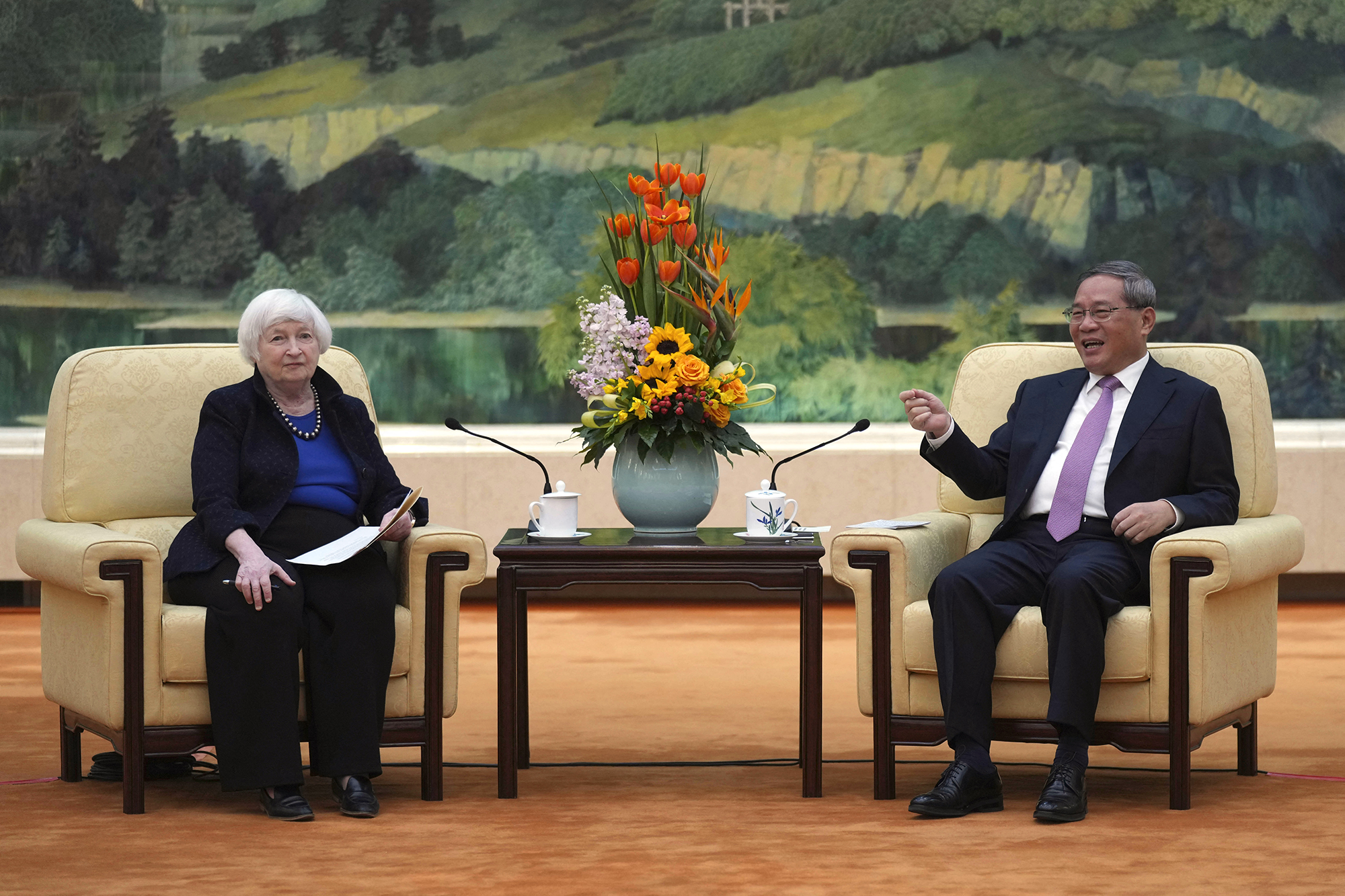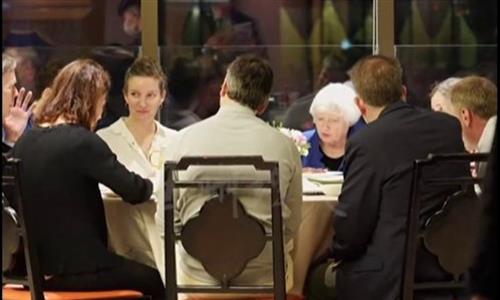
Chinese Premier Li Qiang (right) meets with US Treasury Secretary Janet Yellen at the Great Hall of the People in Beijing on April 7, 2024. Photo: AFP
Chinese Premier Li Qiang on Sunday met with US Treasury Secretary Janet Yellen in Beijing, where he urged the US to work with China to adhere to the basic norms of the market economy of fair competition and open cooperation, and refrain from politicizing or overstretching the concept of national security regarding economic and trade issues.
Yellen's closely watched trip to China, which includes meetings with senior Chinese officials, has underscored the signs of stabilization for China-US bilateral ties amid increased exchanges between high-level officials. However, the US is continuing its crackdown campaign against Chinese industries and businesses with claims such as "overcapacity," posing risks for the bilateral relationship, experts said.
During the meeting on Sunday morning, the Chinese Premier said that under the strategic guidance of the two heads of state, China-US relations are currently stabilizing, and China hopes the two countries can be partners rather than adversaries, with mutual respect, peaceful coexistence and win-win cooperation, according to the Xinhua News Agency.
Li noted that as the world's two largest economies, China and the US have deeply intertwined economic interests, and strengthening economic and trade cooperation is of great significance to both sides' respective development and global economic growth. He called to strengthen communication and jointly look for ways to manage and resolve differences.
Notably, the Chinese Premier said it is hoped that the US will not politicize or overstretch the national security concept regarding economic and trade issues, and view production capacity issues objectively and dialectically from a market-oriented and global perspective, according to Xinhua.
The US has used various pretexts such as "national security concerns" to justify its ever-expanding crackdown campaign against Chinese businesses and products, even as US officials repeatedly state that they are not seeking to decouple the two economies. In what appears to be another sign of more crackdown measures, Yellen has recently raised what she calls China's "overcapacity" issue.
During the meeting on Sunday, Yellen said that with joint efforts from both sides, US-China relations have been put on a more stable footing, and the US appreciates the progress made in US-China economic dialogue and cooperation and does not seek "decoupling" from China, according to the Xinhua report.
Positive signals
Yellen's trip, her second since July 2023, has drawn widespread attention both within China and across the world, as many watch closely new developments in the China-US relationship often viewed as the world's most consequential bilateral relationship. The trip, along with a series of recent high-level exchanges, has improved expectations for stable ties.
Days before Yellen arrived in Guangzhou, South China's Guangdong Province, the leaders of the two countries held a phone call, in what analysts call an "anchor for stabilizing ties." In Guangzhou, Chinese Vice Premier He Lifeng met with Yellen and had "candid, pragmatic and constructive" communication.
"Yellen's visit to China sends a positive signal, showing that China and the US are willing to communicate, and we must fully affirm this," Huo Jianguo, a vice chairman of the China Society for World Trade Organization Studies in Beijing, told the Global Times on Sunday.
Huo noted that the decision to choose Guangzhou, which is known for its economic development and openness, as the first stop on Yellen's trip indicates the "pragmatic" nature of the visit that focuses on commercial issues and businesses. "Choosing Guangzhou as the first stop appears to be downplaying the official tone… Yellen is more pragmatic during this trip and willing to have contacts with companies so as to create a more relaxed atmosphere," he said.
In Beijing on Sunday, Yellen met with Beijing Mayor Yin Yong and visited the National School of Development at the prestigious Peking University, where she held discussions with the faculty and students, according to media reports. Meanwhile, Yellen's choices of food in Guangzhou and Beijing also became hot topics on Chinese social media, highlighting great attention to the trip.
While the trip is a welcome sign for many in China and around the world, some remain cautious toward the US, as they note Washington's relentless crackdown campaign against Chinese businesses and products.
"The US has a long-standing two-sided approach toward China, in that it seeks to suppress and cooperate with China at the same time. We have to see both sides. The US' crackdown does not necessarily mean bilateral ties will break down, and cooperation does not necessarily mean there will be no problems between the two countries," He Weiwen, a senior fellow from the Center for China and Globalization, told the Global Times on Sunday.
He said that while recent exchanges between the two sides showed the gradual improvement in China-US bilateral ties, there are also some baseless claims raised by the US side.
During the trip, Yellen repeatedly raised what she described as "Chinese industrial overcapacity," which she said could lead to "overconcentration of supply chains, posing a risk to global economic resilience," according to media reports.
During the talks in Guangzhou, the Chinese side expressed grave concern over US economic and trade measures restricting China and responded fully to the issue of production capacity, according to Xinhua.
Experts said that the US' claims of "overcapacity" are baseless and could become pretexts for more US crackdown measures against Chinese products and businesses.
"There is a certain amount of anxiety in the US now, because many US industries are no longer competitive in the world. They can't compete with China, so they can only take certain administrative measures," He Weiwen said, noting there is no factual basis in the claim that "China overcapacity" hurts the US and Europe, pointing to small market share or stable export data.
"China is open to discussions on various issues. However, discussions should be based on facts, not politics or ideology," He Weiwen said, noting that such discussions should also follow WTO rules, instead of standards set by one party.


